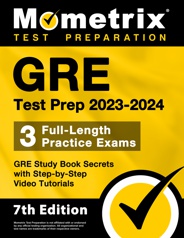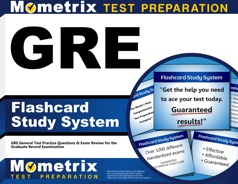
Welcome to the GRE practice test page! The links below will take you to our sample GRE practice tests. These GRE practice questions will give you a better idea of what to study for your exam.
If you need additional practice questions, get our GRE study guide, online course, and flashcards. Good luck with your studying!

Check Out Mometrix's GRE Study Guide
Get practice questions, video tutorials, and detailed study lessons

Your success on GRE test day depends not only on how many hours you put into preparing but also on whether you prepared the right way. It’s good to check along the way to see whether your studying is paying off. One of the most effective ways to do this is by taking GRE practice tests to evaluate your progress. Practice tests are useful because they show exactly where you need to improve. Every time you take a free GRE practice test, pay special attention to these three groups of questions:
This will show you exactly what your weak areas are, and where you need to devote more study time. Ask yourself why each of these questions gave you trouble. Was it because you didn’t understand the material? Was it because you didn’t remember the vocabulary? Do you need more repetitions on this type of question to build speed and confidence? Dig into those questions and figure out how you can strengthen your weak areas as you go back to review the material.
Additionally, many GRE practice tests have a section explaining the answer choices. It can be tempting to read the explanation and think that you now have a good understanding of the concept. However, an explanation likely only covers part of the question’s broader context. Even if the explanation makes sense, go back and investigate every concept related to the question until you’re positive you have a thorough understanding.
As you go along, keep in mind that the GRE practice test is just that: practice. Memorizing these questions and answers will not be very helpful on the actual test because it is unlikely to have any of the same exact questions. If you only know the right answers to the sample questions, you won’t be prepared for the real thing. Study the concepts until you understand them fully, and then you’ll be able to answer any question that shows up on the test.
When you’re ready to start taking practice tests, follow this strategy:
Check Out Mometrix's GRE Flashcards
Get complex subjects broken down into easily understandable concepts

If you want to be fully prepared, Mometrix offers an online GRE prep course. The course is designed to provide you with any and every resource you might want while studying. The GRE course includes:
The GRE prep course is designed to help any learner get everything they need to prepare for their GRE exam. Click below to check it out!
Sample Issue Question:
All students should study the same national curriculum until college.
Write a response in which you discuss the extent to which you agree or disagree with the recommendation and explain your reasoning for the position you take. In developing and supporting your position, describe specific circumstances in which adopting the recommendation would or would not be advantageous and explain how these examples shape your position.
Sample Argument Question:The following is a recommendation from the Board of Directors at a bookstore.
We recommend that this bookstore open a café. This bookstore has been in business for over twenty years and has a large customer base due to its wide selection of books. Opening the café would obviously attract more customers. We could open space for the café by closing the children’s book section, which will most likely become less profitable due to a recent national census showing a significant decline in the population under age ten. Opening a café will allow our store to attract more customers and compete with rival bookstores that recently opened their own cafes.
Write a response in which you discuss what questions would need to be answered in order to decide whether the recommendation is likely to have the predicted result. Be sure to explain how the answers to these questions would help to evaluate the recommendation.
The essays are typically scored by university literature/writing professors. However, ETS has recently developed an “E-Rater”, an automated essay grader. This does not replace the human essay grader; rather, it ensures that the human grader is paying attention to their job. If the E-Rater’s score differs by one point or more, it is sent to another human grader. The final score is the average of your two essays rounded up to .5.
The graders are looking for clarity, coherency, and cogency. In other words, your ideas must be expressed in a clear manner with the ideas logically connected and backed up by convincing evidence. Style is important as well; your sentences should be well-written and use sophisticated vocabulary. You must also pay attention to proper grammar; a couple of mistakes won’t impact your score all that much as long as the rest of the essay is well-done, but the grader will notice if you make too many mistakes, and it will negatively impact your score.
Longer essays tend to score higher than shorter ones (although substance definitely matters). It is recommended that your essay consist of at least five paragraphs: an intro, three body paragraphs, and a conclusion.